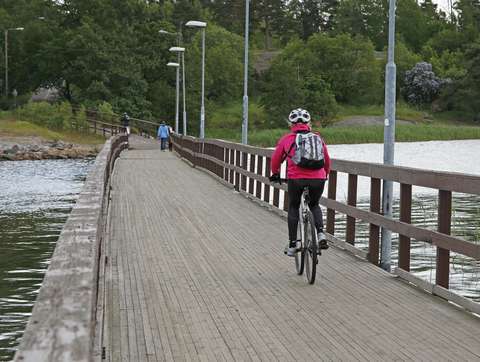Sustainable development work is an important part of cooperation between cities
Work on sustainable development will be increasingly important for cities in the future. Social, cultural, economic and ecological impacts will have to be taken into account in virtually all activities of cities.
6Aika has strengthened the network of experts in cities and increased common understanding of the opportunities and challenges of development, such as how to develop with businesses and universities, how to involve residents and how to make the best use of the results of development.
An ecological solution may also be economical
“An ecological solution may also be an economical one in the long term,” explains Iina Kallio from the City of Espoo Environment Department, who has coordinated the Carbon neutral and resource-wise industrial areas project in the 6Aika strategy.
The environmental value can be used as a criterion for competitive tendering. At Lukutori, a pilot emission-free construction site, this made it possible to use Finnish stones, decreasing emissions from production and transportation considerably compared to importing stones from abroad, which is usually done in infrastructure construction. This supports Finnish employment. Taxes on production, transport and driving forces will also remain in Finland. The multiplier effect on the national economy is considerable.
Experiments support low carbon goals
The City of Espoo’s Sustainable Development Team, which is developing Kera as a circular economy showcase area, has worked on the same issue.
“The development of the circular economy supports the city’s carbon neutrality objective. By experimenting with the circular economy, we support changes in operating methods and sustainable everyday choices,” say Reetta Jänis and Mia Johansson from the Partnership model for sustainable neighbourhoods project.
In addition to emission reductions, experiments create new innovations for companies and a new understanding of business models in the circular economy. In addition to new business for companies, the city benefits through savings. Sustainable solutions also increase residents’ well-being and promote sustainable everyday life.
Savings of 20,000 megawatt-hours equal €1.5 million
The connection between emission reductions and economic sustainability has also been considered at the City of Espoo Premises Department public utility. Joni Leinonen participated in the Energy Wise Cities project.
“In fact, all our activities are aimed at the objectives of the city’s energy-efficiency agreement. The energy-efficiency agreement has an energy saving objective of 7.5% between 2017 and 2025. As annual electricity savings, its value would be €1.7 million,” Leinonen says.
The project studied how the energy and condition data from buildings can be visualised for experts and the users of the buildings.
“More generally, we learn about the acquisition of systems, knowledge-based management and the analytics of energy and condition data. The pilot taught us good lessons for future acquisitions,” Leinonen says.
Experiments are springboards for new services
Development by experimentation has been an important part of all projects related to sustainability. In some projects, the development of procurement has been important, while others have from the outset strived for the city to have a role in convening the actors and developing the development environment, but the new services are intended to operate under market conditions after the experiment.
This is particularly highlighted by Karoliina Korpela from Enter Espoo: “The aim of the Last Mile project was to try out new market-based solutions to complement public transport and improve the accessibility of the Waterfront Walkway, the archipelago and Nuuksio. Through experiments, we supported entrepreneurship and the visibility of companies. At the same time, we promoted Espoo’s goals related to sustainability, responsible tourism, experimentation, learning together and recreation in the surrounding nature.”
Korpela’s work on tourism and low emissions continues in another project, CarbonWise.
“We are currently developing training related to the responsibility of hotels and other tourism companies with other cities. Responsibility is no longer a ‘separate issue’, but an issue that affects the company’s competitiveness and visibility. Both individual travellers and those making larger purchases will require companies to take responsibility into account in the future.”
Social sustainability alongside ecology and economy
There may also be other objectives related to the economic and ecological ones, such as social objectives. Tuomas Kiuru and Mari Päätalo from the Sustainable Development Team say that a transport system based on private motoring can put people without cars at a disadvantage. The Low-carbon transport in mobility hubs project is therefore experimenting with, for example, a charging cabinet for electric bicycle batteries, a car sharing service and remote monitoring of bicycle parks to promote sustainable ways of mobility in the city.
“Individual experiments do not change the overall picture. However, an experiment can be bigger than its size in many ways, and by promoting experiments we can get more service providers to the area,” Kiuru adds.
Partners of cities play an important role in controlling emissions
All the above-mentioned city experts said that the city plays a key role in curbing energy use and emissions, but the city’s partners also have an important role.
Our goal is to learn from experiments and move towards more effective cooperation with companies. The residents of Espoo have been involved in many experiments as users of the services. Cooperation in the development of services, but also in communication, was considered very important: the city and companies together are building a better city for the residents.
Additional information
- Johanna Lyytikäinen, Programme Manager, 6Aika Strategy, tel. +358 40 723183, johanna.lyytikainen@espoo.fi
- Päivi Sutinen, Director, City as a Service, tel. +358 46 8772871, paivi.sutinen@espoo.fi
- 6Aika.fi(external link, opens in a new window)
With this story, we launch a series of stories about the City of Espoo’s work in the 6Aika strategy in 2014–2022. The joint 6Aika strategy of the six largest cities in Finland (Helsinki, Espoo, Tampere, Vantaa, Oulu and Turku) develops more open, smart and sustainable services in cities. The focus has been on identifying the city’s challenges and trying out new solutions between the city, companies, residents, educational institutions and universities.
Other parts of the series of stories:
